Southbound, solo: the Americas - report by Adriaan
The First Week
Goodbye
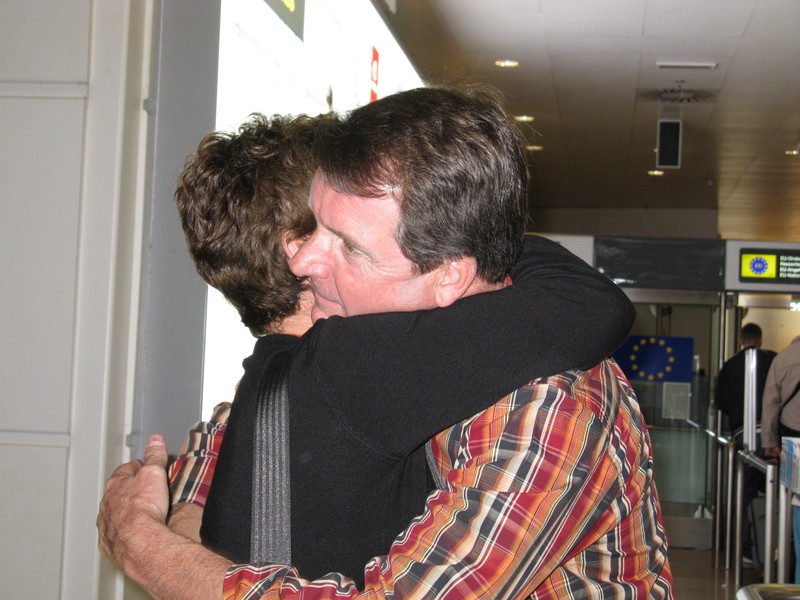
"Will you be careful?" - Isabelle whispers in my ear while we hold each other tightly. "But of course", is my mechanical response. I'm lousy in saying goodbye, but it has to be done sometimes. Like today, on Brussels Airport on this 14th day of June 2009. Isabelle and I 'have a thing' for four months to the day. Initially, we didn't expected us to pick up speed, but we have gotten to know each other intensively. Now this goodbye is really though.
We dutifully do the necessary and keep a straight face. Not that it's required, because the only ones who would see our emotions are very trusted friends: JC (and daughter Caroline) and Marcel. And I think they figure that we're not really in a joyful mood anyway. The four of them will tour Brussels later today. Maybe they'll be able to cheer up Isabelle a bit.
Nine hours later, it's time for immigration in Philadelphia. There are long queues, but like usually, there are shorter ones in front of the more distant windows. I am immediately confronted with what kind of country I'm in: this is the USA, post-9/11. Every window is fitted with a sign explaining what (prison)sentences will be handed out should anyone get angry with the federal servant behind the window. The one processing me checks my passport and visa, takes my picture and scans all of my fingerprints. The US authorities are collecting a lot of (digitized) information. There are drawbacks to the low price of harddisk storage...
But, I do get a stamp allowing me to stay for 6 months and I can continue my journey to Miami. Between Philadelphia and Miami, we'll have to cross a large area where it's very warm, and where there are many thunderstorms at the end of the day. It's a bumby flight, with falling flight attendants and all. Approaching Miami takes long, because we have to find an opening in the thunderstorm clouds and wait for other traffic at the same time. We're flying at low altitude for a long time, sometimes above the Cumulus Nimbus, sometimes below them. We're shaken violently everytime the plane touches the tops of the clouds. I'm in a leg-room seat next to a window and I'm enjoying the size of the clouds which I usually only see from below.
More delays
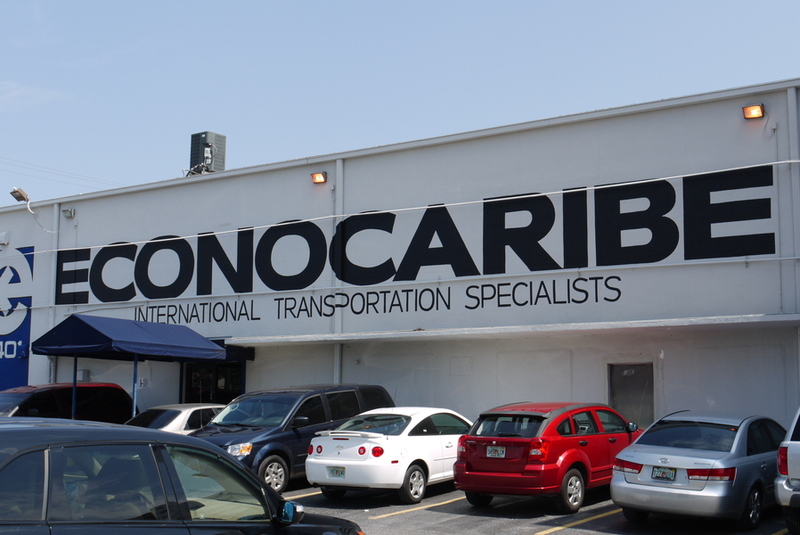
June, 15th 2009. My motorcycle is in Miami. I even know which warehouse - I've already been there. But I did not see my bike: it's in the bonded section awaiting release by customs. So far, all good news, since this is normal procedure.
"Well. We, the USA, cannot admit your motocycle. You'd better ship it again. Back, or elsewhere." The very fat man gets up. His belly is even bigger than what I thought while he was sitting. Droplets of perspiration run from his hairline along his round, poorly shaven jaw. I reckon that he can no longer reach his cheek with his right arm and that could be the reason he is shaven unevenly. His chin is connected to his chest by a straight line.
He sighs again. Maybe that's because I asked him a difficult question, but probably because of the enormous effort of erecting this heavy body. My question was: "I'd like to ride a non-conforming motorcycle, leave through Canada, enter Alaska (and thus re-enter your country), leave again, to enter again in Oregon State. Eventually, I'll leave the territory via Mexico. What forms do I need to fill out?"
By means of an international treaty (of The Hague, Netherlands), signed by almost all countries in the world, the USA is obliged to allow me to ride my European bike on its road system. Every participating country, in return, has the right to do the same. An American is entitled to ride his or her American vehicle in Belgium by this treaty. And it's done all the time: all military personel in Germany do it.
They should know that here, in the 'freeport Miami', in the customs department. I will not let them turn me down. "I have this form, filled out and signed, that I downloaded from the Internet -" The man starts a long story which should explain that one should never, ever believe anything you find on the Internet. "And what if it's from a .gov domain?", I retort. The man looks at me with pity. He probably doesn't understand that the US government has its own top-level domain (along ".com", ".org", or ".be"). Maybe he doesn't want the extra work and he'd rather get rid of me. I know the type. In an uniform hat, gun on the hip, but no brains and definitely no motivation. I know what to do: be difficult. But this old hand sees me coming: quickly, he hands the paperwork to a younger colleague.
Fortune is on my side: this man, with more stripes that the fat one, not only knows what I want, he also knows how it's done. Unfortunately, customs (now part of Homeland Security) cannot accept the form I had downloaded an filled out while still in Belgium. The EPA (Environment Protection Agency) has to approve in writing. "Look", he says, "this is the way that looks." Helpfully, he shows me an EPA letter to some Priscilla van Linschoten, who imported a ZX9R in March 2009. The fat man dragged his body back to his own cubicle. I avoid eye contact, since even he must feel he's wrong.
There is a minor problem, however. The EPA is about 20 hours by car from here. Officer Politakis calls his contact (Ron) at the EPA. Most of the procedure can be handled by e-mail. I e-mail copies of my passport and registration. I'm glad I spent so much time in preparation: PDF copies of those documents are already om my PC. I won't have to search for a scanner and such.
I'm thinking: "So far, so good". But the delays are caused by the EPA's willingness to work. I call Ron myself: "Tomorrow, you'll get a memorandum by e-mail. That's some kind of contract in your name. Print it, read it, sign it (if you're OK with it), scan it and e-mail it back. You'll receive the written approval the next day".
I have little choice: for the next two days, I occupy myself with getting insurance, looking for a plug that fits American outlets, looking for a place where I can scan a signed memorandum and finding a new place to stay.
I had to make reservations in some kind of hotel, because I needed an address. Immigration needs to know my address while in the USA, and customs (and police) would have come and arrested me in case they found narcotics with my motorcycle. I booked something close to the airport and the freight forwarder. It turned out to be in the middle of Miami, with no parking space for my rental car. Let alone I could pack my motorcycle there. A hotel with a parking lot close to the room is called ... a motel. I find one that will serve the purpose on the other side of the airport.
Unpacking
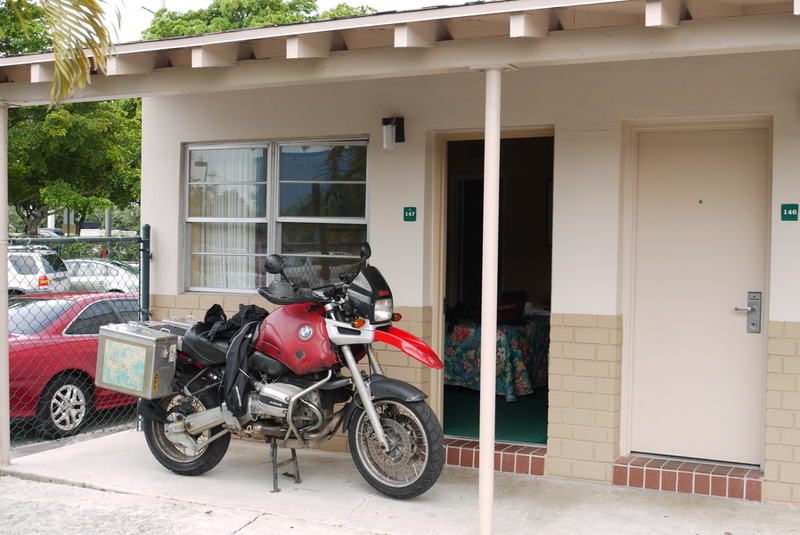
Ron's work is ready, ahead of schedule: the authorization of the EPA's already in my (Internet) mailbox, as I'm coming back 'home' to the motel on June 16th. There's still a few things that can go wrong, and I have trouble sleeping. I'm at Kinko's at 8:30 AM, to print the letter in my e-mail box. (Kinko's a chain of stores with all kinds of office equipment for public use. Very handy!) I'm at the Freeport Miami before it's 9:00 AM, visiting the custom department. The fat man is happily highlighting two lines on each form in a huge stack, but officer Politakis is nowhere to be found. He explicitly instructed me to ask for him - advice I heed, thinking about the fat's first suggestion (to ship the bike back of elsewhere).
"No, officer Politakis won't be here", a colleague explains, "not for the entire morning". Fortunately, this man's knowledge is just in between the two others, and he's prepared to handle the subject. At 10:00 AM, I'm back in the car, speeding towards EconoCaribe (the shipping-agent). I trade the customs document and US$ 260.00 for a piece of paper that entitles me to retrieve the motorcycle at the warehouse, a bit further down.
"Which truck is yours?", the chief warehouseman asks. "No truck is mine", I respond. They're not really used to 'pedestrians' that pick up 100-cubic feet crates. I explain my intentions. I also ask them for electricity, since I won't be able to undo all those screws manually. Meanwhile, a forklift driver reluctantly shows up with the crate. The screws are untouched: US customs may have held up the entire container, but they did not inspect my crate. I'm staring to believe I can ride my bike shortly.
Looking for an outlet, I start exploring the vicinity. All of a sudden, there's a voice over the loudspeakers. All men look up, startled. Two approach me. "You'll have to stay behind the yellow line on the floor!", they say, while pointing up towards a camera that looks over the unloading area. "This is a bonded warehouse, supervised by US customs", they explain. Appearantly, the US government is spying over what goes in and out with camera's. It gives me an Orwellian '1984' shiver down my spine.
The crate is right next to me - I could touch it - but the men become very formal. "We could put it outside the gate and do the transfer there", they suggest. That would put me in the the 110°F sun, and without electricity. I oppose and try to look helpless at the same time. Eventually, they allow me disassemble the crate in the shaded loading dock, where the trucks normally would be, not too far from a wall outlet. "But after lunch!" - it's noon now. That's fine, because 'lunch' will give me time to chase up an electric drill with an extension cord.
After lunch, the wooden box is moved again: a whole six feet, across the line. They make me sign a photocopied paper and my bike is mine again! The forklift driver still doesn't feel like working, but he drives all the way around the building to put my crate on the lower part of the loading docks nonetheless. Isabelle and I worked two days to build the thing (that includes drinking some beverages...). But now the whole thing is taken apart in under one hour. The engine starts - nobody notices that the fuel tank is not completely dry (as supposed).
One problem remains: six wooden panels and a lot of screws. I have offered the crate for free on an Internet discussion board for travellers, as well as on the BMS GS mailing list, but I received no response. The unwilling forklift driver thaws immediately when I offer the drill to him. He even tries to speak English (it seems to me that Miami is Spanish spoken, about half the time). My proposal: "hide these six planks for four months somewhere and receive US$ 50.00 reward" is enthusiastically accepted. In case I do not return within four months, our beautifully crafted, fumigated wooden crate could be ... set afire.
But if they won't admit me to flu-striken Mexico, I'll have a crate to ship me to South-America stashed in Miami.
I leave the compound, without anyone batting an eye. I put the first mile of many behind me. I'm amazed that the US government has not verified that my bike actually has functional brakes and lights. Nor did the government force me to take (minimal liability) insurance. Even Syria does that better.
By the way: insurance is expensive here. The extraordinary thing is that the companies limit their liability to a measly US$ 20,000.00. With that money, you can't even replace the other party's car! American motorists pay extra, because they take coverage for their (own) medical costs. I think that an accident in the US could wreck your life financially. Anyways, with some extra effort, I now have liability coverage of US$ 150,000.00 and nothing for myself (since that's arranged with an Belgian company).
Lane splitting
June 18, 2009. "Well, sheriff, I've earned that citation, cause I've been doing it all day," I say. We're on the side of the road, somewhere in northern Florida. Behind my bike is a huge SUV that flashes red and blue light from all corners and holes. The car was inconspicuous, except for the four antennas on the roof, until all those lights came on. Two men in uniform jumped out, one of them is the sheriff himself.
I started this morning in Miami and I do what I always do: drive by or between the cars at the traffic lights until I am in front. It's one of the advantages of riding a motorcycle. It shortens my waiting time, without disturbing the waiting drivers behind me. In Europe there are people who can't endure other peoples good fortune and here I get many (honking) 'remarks' as well.
Those people did not suffer from envy - they were right. "Lane splitting" is forbidden here. "You're from outside the state, from New Mexico, right?", the other one asks, while he's checking out the motorcycle. New Mexico appearently also has yellow plates with black letters. "Well, from outside the country", I say and the obligatory conversation starts. "Where are you going?", "Have you really driven to Australia before?", "Is it a BMW?" and so on. Amazement and disbelief are my share, and this time leniency as well. I get to go.
Highway
At the end of the afternoon, I stop in a motel with a swimming pool (in Alachua). The lukewarm water doesn't cool me down very much; I go to the bar next door. It's one of those pubs at the intersection of two roads that everybody knows from american road-movies. Dark, smoky, country music with no high frequencies, a one-armed bandit, a pinball machine and a billiard. America likes to be very decent, but this is one of the places where that self-discipline is set aside. I am immediately accosted by a drunk woman who turned 40 today. She summarizes her whole life in a monologue of a few minutes. She is (already) a grandmother, survived a car accident last year, "My son is here at the pool table", and so on. I'm out of here.
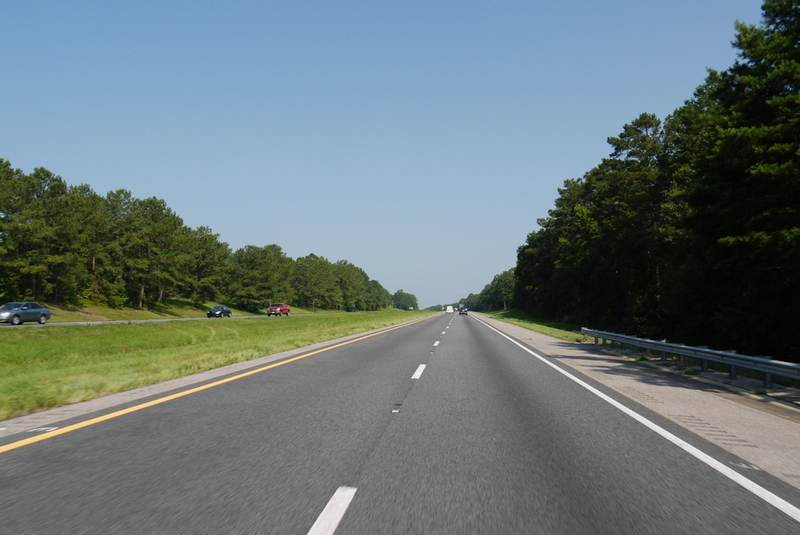
I am on my bike at 7:00 am, the morning of the 19th of June, when I decide that riding secondary roads is fun as long as it is not too warm. When not long after that the thermometer reads 30°C (86°F), I look for a highway. It will be Interstate 10, heading west. Interstates are ... annoying, long-winded, straight, but fast. I soon get to Alabama, at the end of the afternoon.
I try a camping, but I don't like it: I'm very warm all night, but I'm still lying in the noise of the air conditioners on top of the campers and caravans. "Then rather noise and coolness", I reason, and at the crack of dawn I'm already motorcycling (at 5:45 am - in Alabama it's one hour earlier than in Florida) but the sun 'doesn't know'....
New Orleans
I'm following the '10' for a while - until I get to New Orleans. I follow the signs 'downtown' and as soon as I'm off the highway I see dancing people, under a bridge. Something is being grilled, so my nose knows. But I am on my way to downtown and drive on.
I leave the bike in the care of the parking attendant of a large garage, who starts a 'business': the bike is allowed to stand next to the place where he and his colleagues are waiting for customers (who use the valet service). On foot, and armed with a camera and my digital audio recorder I go into the city where much of the american music was born. And it doesn't take long before I have recorded my first live performance. I still have to get used to the device and maybe I can do better in the future. But in the meantime I do have some very interesting practice material.
There is a lot to see, from the typical crowd-pullers to the not so obvious. I take some pictures of people photographing each other, so the immortalized one often gets a smile on the face even before the command "cheese" is given. There are a lot of people of all sorts. Apparently the crowds of tourists are coming back, since the floods. One of the things I like to do is making portraits of natives. Well, most of them here are American, but they're not in their right place.
One of the locals is Robèrt. He lives here and sits on a sidewalk drinking a beer in the midst of this tourist turmoil. After a greeting I sit down next to him and together we watch the stream of people passing by. The distance between them and Robèrt is tangible, and I feel like a voyeur. "Yes", says Robèrt to me, "fought in Vietnam, was decorated, rejected for work: 'Veterans Affairs' takes care of me. I get just enough money from VA to get through the month, drinking. What do I care?" I'm sitting next to somebody who was broken two wars ago and didn't recover. His resignation is almost admirable - he's found a balance that suits him. When a more heavily perfumed lady passes by he makes a remark about her body, but as if he's watching TV. Being so close and yet feeling so much distance...
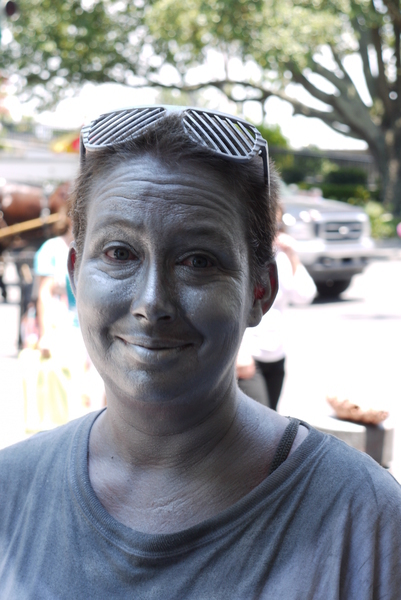
After another short walk I have a chat with Sonia, a mime street artist, who wears a homemade space suit. Her face is metallic colored and she is visibly warm. It is very warm: about 35°C (95°F). But the humidity (more than 80%) makes it difficult. Sonia has other problems with the heat: it makes tourists miserable. "I've only got $4, and it's already afternoon!", she moans. I don't know if I should believe it, and start talking about something else. Via "do you live in this town?", and "for long?" to "Katrina?".
Next is a story that's not about storms at all. "A friend of mine, a police officer, committed suicide. He couldn't take the powerlessness anymore." She goes on about the fact that this cop wanted to help, but couldn't do anything. The dead bodies floated in the brackish water, the stench was unbearable. I wanted to know what a storm feels like, but this is her Katrina. "People who had fled to their attics, hoping the water wouldn't rise that high. And then they drowned under the ridge of their roofs in their own homes." (Most of the attics here don't have a window - ever since everyone has been urged to keep an axe in the attic so you can chop a hole in your roof). Sonia is having a hard time with it again - time for another topic. But she goes on for a while: "Do you know that Katrina killed about as many people as did in the 9/11 attacks?" I don't have an answer, other than, "If half the money for those wars had ended up here..."
In the smaller streets, away from the big crowds of tourists, I see a motorcyclist rearranging his luggage. For me this is very recognizable, and it doesn't stop there: Andrew also wears a wide-brimmed hat, also has an old bike, always packs most of his stuff in the same place (so he doesn't have to search), uses a marker to draw the road on the map and ... hasn't really taken kindly to cities. But tonight will be his exception: he will explore the city tonight and stay 'in town'. "Yes, a bit away from the big crowd", he explains his plan, "here in these backstreets you can also find nice clubs. What are you going to do?" he asks. "Me? I'm off! I've been walking around for two hours and that's more than enough. You know what I really want? When I came into town, I saw under a bridge..." "Have you seen them too?", Andrew interrupts me, "I should have stopped right away." Apparently, people who travel for a long time come up with the same 'solutions'.
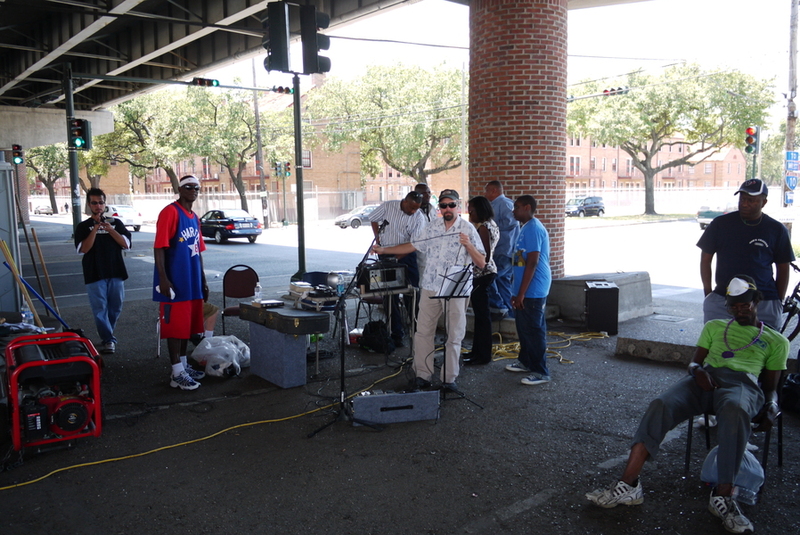
Once again under the bridge, the party has faded a little bit, but I am promptly invited to eat the hamburgers and hotdogs they have grilled. There are many more 'Robèrt's' here, but now with a somewhat darker skin. The local church community has organized this meeting with the help of the neighborhood supermarket (which sponsors the hamburgers), the snack bar (which supplied occasional soft drinks) and so on. I meet the man who arranged it all and then the pastor. I reject the meal (because of atheism, but I don't tell them that).
On the side, some people are sitting behind a table and a sign with an (discontinuous) circle. It is a company, trying to persuade people here to participate in one of their rehabilitation programs. Especially drugs, but also alcohol. For non-addicts, who need a push to get out of the vicious circle of poverty hopelessness, they also offer a program. Isabelle recently started working for a private organisation that takes care of the elderly, so that sign arouses my curiosity. "What is meant by: 'Inc.'? That's a company, isn't it?" is my opening question. The director is found and a little later we are talking about government regulation and control versus (entrepreneurial) freedom.
Here in the US, healthcare is completely commercial, with the result that it is inaccessible to millions of Americans. Insurers pick up the pieces by screening their clients - if you've ever had cancer, you can't take out new insurance here (at a normal premium). And in spite of strict admission, insurances are expensive. That's not how it should be, Hillary Clinton and Barack Obama think, and they are going to change something. (What? That's today, June 20th, still unclear. But the conservative lobby is already warming up with commercials on TV).
Well, I can understand those conservative arguments: when I think of the Belgian Post Office and I project that we-have-the-monopoly attitude on healthcare, I would be against it too. There has to be a middle ground, and it could well lie in the establishment of strict frameworks by the government, within which companies are allowed to fill in the healthcare.
And that's exactly what this man does. By now he has about 250 'beds' in three branches, and a multiple of ambulatory patients. He bought a disused building next to the bridge last week. He expects to be able to create 30 beds there, at minimal cost. Every time I visit a hospital in the Netherlands I am amazed by the expensive buildings - something this American entrepreneur is not going to waste any money on. Of course he complains about the interference of the government, and the controls, but to the question: "Do you think it's a good system?" he answers wholeheartedly "Yes".
Parkway
In Baton Rouge, I find a hotel near a swimming pool. I've driven 1850 kilometres (1150 miles) in three days and that's too much. To compensate for the two and a half week delay would be good, but not if I get ahead of myself. Moreover, this story has to be written: I decide not to travel on June 21st. But that day I don't write much and I don't see the swimming pool up close either. I sleep a lot and write e-mails.
On the 22nd I start early again (6:40 am) and while it is still cool I take a picture on the banks of the Mississippi River; here is my 'turn right now' point. Further north, along the river. The humidity is still very high and at ten o'clock, in a place called Natchez, everything sticks. On a sign I read "no commercial transport on Natchez Trace parkway". The road is not on my map but would parallel 'my' state highway which is on the map.
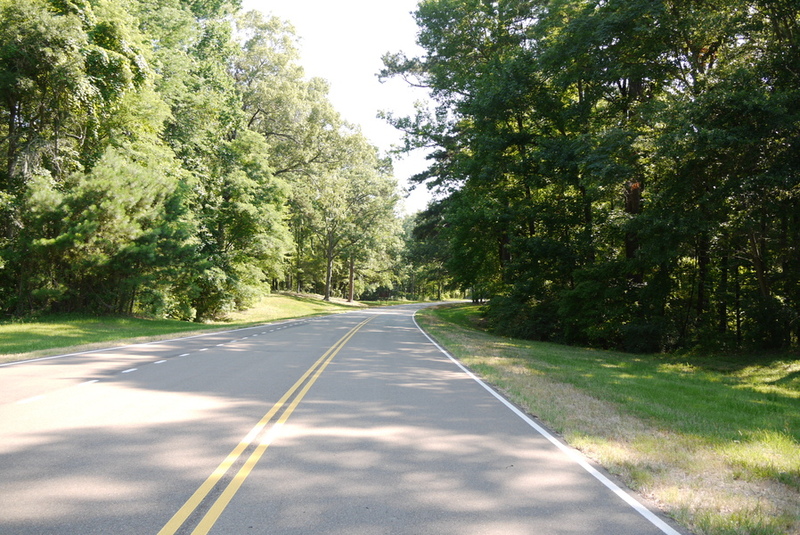
And so, by chance, I end up on one of the most beautiful roads in the US. A parkway is a road that is maintained by the 'National Park Service', where only recreational traffic is allowed, and not faster than 50 miles per hour (80 km/h). There are no companies, no billboards, no motels. What remains is nature, with mowed verges. It is a special experience, although in the afternoon I drive along the park road for a while, not to lose sight of the real America.
Rural Mississippi is as I've seen it in movies: gently rolling hills, a large part of which has been cultivated. The land is used for cattle breeding (cows, but also some horses) and agriculture. It offers an attractive, varied view. I didn't expect that there would be houses everywhere. Even far away from the small villages I drive through, there are houses. No farms, but shelters on a few thousand square meters. Some very nice ones, surrounded by verandas or stately pillars if the house has two floors. The simpler houses are pre-fab houses: I sometimes see those houses passing by on a truck.
It strikes me that here too the grass is mowed fanatically - everyone mows at least the part of their own land that borders the public road. It's like territorial instinct.
Although you're not allowed to drive fast, the park road is a pleasant passage, because once I deviated from the parkway I see another thing that was missing: traffic lights. The rest of the afternoon the landscape passes me by; after almost 11 hours of motorcycling I settle down in a motel in Tulepo for a night.